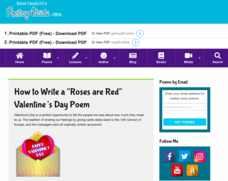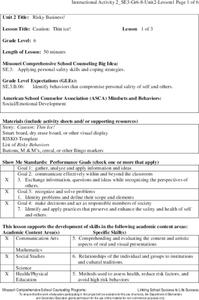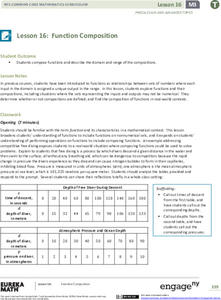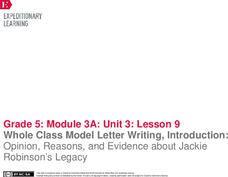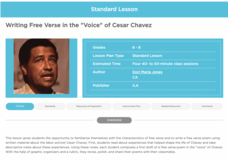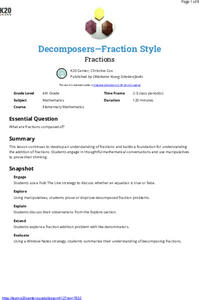Poetry4kids
Personification Poetry Lesson Plan
Scholars take part in two exercises to boost their knowledge of personification. After reading a detailed description and excerpts from famous poems, writers list action verbs and objects then combine words to create a humorous...
Poetry4kids
How to Write a “Roses are Red” Valentine’s Day Poem
Compose a Valentine's Day poem! Practicing their rhyming skills, scholars follow the traditional format to create a happy poem for a friend or family member.
Poetry4kids
How to Write a Concrete or “Shape” Poem
Writers compose an original shape poem. Scholars choose a subject to write about and create a visual representation by forming a corresponding picture using the poem's words.
Poetry4kids
How to Start a Poetry Journal
Practice makes proficient! Using a journal of their choice, authors organize pages, then begin their writing journey of on-going writing practice in which they compose all poetic forms including diamante, limerick, free verse, and more!
Poetry4kids
How to Write a Limerick
Add a little fun and fancy to English language arts with an activity that challenges scholars to write a limerick. Authors follow five rules in order to compose an original poem that contains a specific rhyme scheme.
Poetry4kids
How to Write a Cinquain Poem
A lesson challenges scholars to create a cinquain poem. Writers begin by choosing a topic and brainstorm details, then compose their original poem making sure to count syllables.
Poetry4kids
How to Write a Diamante Poem
A lesson begins with a description of a diamante poem and the rules to follow while writing one. Scholars examine the ins and outs of synonym and antonym diamantes, then compose an original poem using their newfound knowledge.
Poetry4kids
How to Write a Repetition Poem
A repetition poem is the focus of a lesson that challenges scholars to compose an original piece. To add meaning to their poem, authors choose words to repeat at the start of most lines.
California Department of Education
Hitting the Write Note: Writing a Proposal
To whom it may concern ... Scholars undergo the process of writing a letter to an authority figure. The instructional activity asks writers to compose a formal letter requesting a music therapy space. Pupils learn how to submit a project...
Nemours KidsHealth
Self-Esteem: Grades 3-5
Two lessons examine self-esteem and encourage scholars to exude confidence. Lesson one asks learners to recognize the characteristics of self-esteem then create a collage compiled of images that reflect their skills, accomplishments, and...
Missouri Department of Elementary
Caution: Thin Ice!
Sixth graders listen to a story titled "Thin Ice!" then partake in a whole-class discussion asking and answering questions about what was read. Scholars brainstorm risky behaviors in preparation for a game of RISKO—a game similar to...
EngageNY
Function Composition
Combine functions for the first time. Pupils investigate composition of functions using a function table and then function machines in the 17th installment in a 23-part Precalculus series. Scholars learn the two notations for composition...
Scholastic
Writing Letters of Gratitude
A lesson begins with a discussion on gratitude—what does it mean, and for who are learners thankful? Scholars share their thoughts and feelings then choose a community worker to which they wish to share their gratitude. Writers compose a...
EngageNY
End of Unit Assessment, Part 2: Drafting Introduction and Conclusion of a Narrative
First and last impressions matter. Scholars compose the introductory and concluding sections of their narrative writing assignments. Also, to prepare for an upcoming performance task, pupils watch a modern-day monologue from the movie...
Scholastic
Pilgrim and Wampanoag Daily Life
A instructional activity looks at the Pilgrims and Wampanoag tribe during the first Thanksgiving. Scholars compare and contrast information presented by an online activity then discuss their findings. Learners examine the two group's...
NASA
Moon Power - Energy and Power
Be over the moon about finding a resource on lunar power stations. An interesting unit composed of 10 lessons has pupils first learn about the energy and power needs of a futuristic lunar colony. They design and build a lunar power...
EngageNY
End of Unit 2 Assessment: Final Literary Analysis
Get ready to review and revise! Scholars peer edit each other's literary analysis essay drafts. Next, using peer and teacher feedback, pupils compose their final drafts.
EngageNY
Whole Class Model Letter Writing, Introduction: Opinion, Reasons, and Evidence about Jackie Robinson’s Legacy
Sharing is caring! Using the collaborative lesson, scholars engage in a shared writing process with the teacher. Working together, they compose opinion letters about Jackie Robinson's legacy.
PBS
Reading Adventure Pack: Bees
A Reading Adventure pack explores the busy life of bees. After reading a fiction and nonfiction text, scholars complete three hands-on activities. Participants invent a robot that can do the work of bees, cheers to hardworking bees with...
PBS
Reading Adventure Pack: Heroes
Three creative activities follow reading a fiction and nonfiction book about heroes. Scholars build hero action figures out of clay for make-believe play, explain in written form how they show bravery, kindness, patience, thoughtfulness,...
National Endowment for the Humanities
The Glass Menagerie: Impact of Expressionism
Young scholars are challenged to write a realistic analysis of Tennessee Williams' nonrealistic memory play, The Glass Menagerie. Writers use the evidence gathered on their worksheets to craft an effective thesis and concluding statement...
ReadWriteThink
Writing Free Verse in the "Voice" of Cesar Chavez
Introduce middle schoolers to free verse poetry with a lesson that has young poets read two free verse poems and list the common characteristics of the form. They then read a passage from Cesar Chavez's biography and a free verse poem...
K20 LEARN
Decomposers—Fraction Style: Fractions
"What are fractions composed of?" is the essential question of a lesson designed to enhance understanding and strengthen the foundation of adding fractions. Mathematicians start by discussing what makes an equation true or false, then...
K20 LEARN
Building Numbers: Addition And Subtraction Up To 10
Animals on Board! Stuart J. Murphy introduces scholars to composed numbers in preparation for writing and drawing true or false number sentences. A game of Bear in the Cave challenges pupils to locate a missing addend. Sorting number...
Other popular searches
- Music Composers
- Famous Composers
- Classical Composers
- Composers and Decomposers
- American Composers
- Female Composers
- Film Music and Composers
- Renaissance Composers
- Art Music Composers
- Music History Composers
- Music History + Composers
- Jazz Composers



